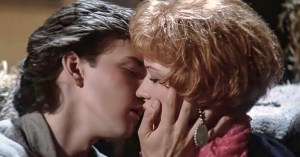Slamdance: Interview with "American Zombie"’s Grace Lee
Director Grace Lee‘s first film, “The Grace Lee Project,” was an exploration of identity that asked the question, “What’s in a name?” In her latest, “American Zombie,” she looks at identity through a different lens: that of the living dead.
“American Zombie,” making its world premiere at Slamdance, tells the intriguing story of two filmmakers who team up to document a community of “high-functioning” zombies in Los Angeles. It begins as a study of a population, but turns increasingly dark as the filmmakers’ prejudices and fears are tested. “American Zombie” is by no means your typical horror show; it’s got its share of morbid laughs and social commentary. Lee talked with Rotten Tomatoes about the appeal of zombies, how to make a “fictional documentary,” and the communal spirit of Slamdance.

Rotten Tomatoes: What’s a high-functioning zombie?
Grace Lee: They’re still the living dead, but they are basically passing as humans. In the film, we learn the different categories of zombies, but in our film we follow these high-functioning ones that are able to walk and talk. Their struggle is to integrate themselves into regular society.
RT: Do you still have a soul or an identity if you’re the living dead?
GL: I think so. I think they’re searching. That’s part of the struggle of being stuck in this transition stage. It’s very confusing.
RT: Did you go back to movies like “Night of the Living Dead” and ask yourself, “I wonder what these zombies are thinking?
GL: I mean, I love those [George] Romero movies. I love the commentary they’re making on American society. I’m not really into just straight gore. There’s something about zombies that’s so absurd. [But] I think the level of absurdity makes you take a look at it in a different way.
RT: How did you come upon this idea?
GL: My background is personal documentaries. I don’t like to call it a mockumentary, I like to call it a fictional documentary. It’s kind of a personal horror film. I’ve always been interested in issues of identity and marginalized communities, so zombies seemed like a good community to explore.
RT: What were some of the troubles you had shooting “American Zombie?”
GL: I think with any independent film, most of us are the same case, where we have very little time and very little money. Our cast and crew came on board, and obviously they weren’t doing it for the money. Everyone was doing it because they really wanted to be part of the project. The problems are what any independent filmmaker goes through. Specifically for me, because it is supposed to be a documentary, and because I’ve made documentaries before, I really like the spontaneity that affords, and I felt like it was an extra effort to try to get that. But it was still a lot of fun. I mean, I’m very clear about the kind of movie I want to make. I want to make the movie I want to see. But I think other people want to see them too (laughs).
RT: How did you come to work with Sandra Oh?
GL: She was in my UCLA thesis film (“Barrier Device”). It was really great. She wasn’t as famous as she is now, but she’d been in stuff. I just called her up, and I was very frank. I said, “This is a student film, and it would take this much of your time. I wonder if I could just send it to you.” And she said yes. And Suzy Nakamura, who is also in “American Zombie,” she was the other lead in that. Both of them were just great.
RT: You were going to make another film with her, right?
GL: We were preparing that, and then it got shut down before we were supposed to shoot. Hopefully we can revitalize that at some point. Instead, we decided to go through and make this movie.
RT: Is straight fiction something you want to movie into?
GL: Yeah. When I went to film school, that’s what I did. I made a short film with Sandra, and that’s how I got to know her. I love everything about documentaries. I really love the form, and I love watching them, too. I think the subject matter here just lent itself to being shot as a fictional documentary.
RT: What did you learn from in the process of making “The Grace Lee Project?”
GL: It started out as a question. You know, “Is ‘Grace Lee’ this stereotypically overachieving Asian woman?” I kinda knew the answer was no, but along the way, I came to grips with [the idea that] there’s a little bit of the arsonist, bad girl Grace Lee in everyone, and there’s a little bit of the statistically average, overachieving Grace Lee in everybody too. I guess the lesson is really simple: Everybody is their own person. I sort of took that “Grace Lee”-making philosophy into “American Zombie,” to try to look at what’s special about them as characters and as individuals.
RT: When did you decide you wanted to make movies?
GL: Pretty late, actually. I’m not one of those super-8 kind of kids. I was always interested in journalism and storytelling. I kind of fell into it. After college (at the University of Missouri-Columbia) I went to Korea to follow my roots; I’d never been there before. I ended up working on a documentary with a friend. I was seeing things I’d never seen before, and I felt the camera would be much more powerful than my lousy writing. It took me a while to decide it wasn’t a hobby, and that’s when I decided to go to film school.
RT: Is it harder for women to make movies?
GL: I think it’s hard to make films in general. My male peers are struggling as much as I am. But I think it’s just a perception of who is a director. I look really young, and I’m short and I’m Asian, so nobody thinks “director,” you know what I mean? I mean, I accept it because it’s the reality, and I’ve gotten used to it.
RT: How’s the response to “American Zombie” been so far?
GL: It’s been really good. Both of our screenings are sold out. People really seem to respond well. They’re laughing in the right places. I’m very happy.
RT: So Slamdance has been good to you.
GL: Yeah. It’s definitely the outsider festival in Park City. But in a way, it’s kind of appropriate for the zombies. They’re marginalized and they’re the outsiders. I think the audience has been really great. And it’s kinda a younger audience too, and they’re really into it.
RT: What are you doing next?
GL: I’m cooking up a few ideas; they’re probably going to be just straight fiction. I always like to make character-driven stuff.
RT: What do you do when you’re not making movies?
GL: Sleep.
Check out our full Fundance at Sundance coverage.







